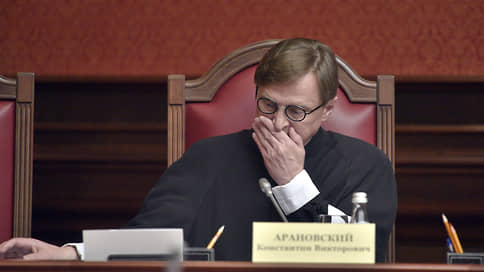Self-expression in the form of resignation – Newspaper Kommersant No. 179 (7380) of 09/28/2022
[ad_1]

On Tuesday it became known that the judge of the Constitutional Court (CC) Konstantin Aranovsky resigned ahead of schedule. This happened on the eve of the alleged consideration in the Constitutional Court of the constitutionality of international treaties on the admission of the Donetsk and Luhansk People’s Republics to the Russian Federation, as well as the Kherson and Zaporozhye regions of Ukraine, which are under the control of the Russian military territories. The expert does not rule out that such a judge’s decision is a way to express a dissenting opinion on this issue.
On September 27, the official website of the court reported that the Constitutional Court “considered Judge Aranovsky’s personal application for resignation before reaching the age limit and satisfied it.” The reasons for this decision were not specified in the message. Konstantin Aranovsky was appointed to the Constitutional Court in 2010 on the proposal of the then President of the Russian Federation Dmitry Medvedev.
This is an exceptional case, notes Olga Kryazhkova, associate professor at the Russian State University of Justice.
Until now, there have been only two such precedents in the history of the Constitutional Court: in 1993, Valery Zorkin resigned from the post of chairman of the Constitutional Court (but remained a simple judge), and in 2010, the Constitutional Court terminated the powers of Anatoly Kononov on his own initiative.
After that, judges retired only upon reaching the age limit, which is 70 years (Konstantin Aranovsky will turn 58 in November). As a result of the 2020 constitutional reform, the list of members of the Constitutional Court decreased from 19 to 11 judges, although in fact at that time it already had only 15 members. By December 1, 2021, as a result of the departure of a number of judges by age, the Constitutional Court fit into the framework established by the updated Constitution. Now, after the departure of Mr. Aranovsky, a vacancy appears in the Constitutional Court.
Meanwhile, as expected, in the coming days, the Constitutional Court will have to check the constitutionality of international treaties on the admission of the Donetsk and Luhansk People’s Republics to the Russian Federation, as well as the Kherson and Zaporozhye regions of Ukraine, which are under the control of the Russian military territories. Five-day referenda on this issue in all four regions were completed on September 27, and all legal procedures related to the admission of new subjects of the Russian Federation, apparently, will be completed within a few days.
The resignation of Judge Aranovsky will not entail any legal consequences and will not affect the performance of the court in any way, Ms. Kryazhkova explains: the Constitutional Court is competent as long as it has at least eight judges. But this event will inevitably be associated with the upcoming verification of agreements on the admission of new subjects to the Russian Federation, she adds. After all, a judge who disagrees with his colleagues has two ways to declare this: express a dissenting opinion or resign. According to research, judges of the Constitutional Court all over the world rarely resort to such a form as resignation, the expert notes. However, since 2020, there is no opportunity for judges of the Russian Constitutional Court to express a dissenting opinion (the amendments adopted then prohibited judges of the Constitutional Court from publishing a dissenting opinion and publicly referring to it), so the resignation of Judge Aranovsky can be considered as a dissenting opinion or disagreement in a situation where it is expressed in another way impossible, says Olga Kryazhkova. She recalls that Judge Aranovsky also did not participate in the adoption by the Constitutional Court of an opinion on amendments to the Basic Law in 2020, this was explained by illness.
Before the ban on the publication of dissenting opinions, Konstantin Aranovsky was not a record holder in terms of their number, but he spoke with an independent position more than once, and this often caused a public outcry.
So, in 2019, Mr. Aranovsky criticized the decision of his colleagues that Russia may not pay nearly €1.9 billion to former Yukos shareholders who suffered from misconduct by management, according to the decision of the ECHR. He also opposed a ban on foreigners owning more than a 20 percent stake in Russian media, although the Constitutional Court considered such restrictions acceptable for “information security” purposes. And in 2020, the judge called the Soviet Union an “illegally created state” and stated that the Russian Federation should not be considered the legal successor of the “repressive and terrorist acts” of the Soviet government.
[ad_2]
Source link








